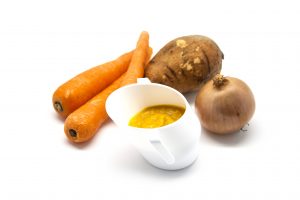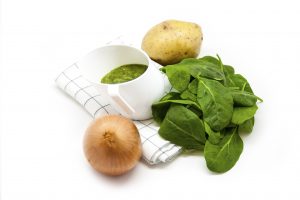The Department of Health recommends waiting till your baby is around 6 months old before introducing weaning.
If your baby was born prematurely it is always best to seek advice from your Health Visitor before you start.
Baby led weaning is for many a preferred introduction to solid foods, it involves offering your baby a variety of foods that they can feed themselves.
What are the signs your baby is ready to begin weaning?
Babies develop at different stages though generally by 6 months old it is now thought their digestive systems are ready to process solid foods.
A baby should be able to sit comfortably unaided and be able to look at, pick up and put food into their mouth. At this stage babies should be able to swallow food rather than push it back out with their tongue. Always talk to your Health Visitor before starting weaning as they can offer you lots of tips and ideas of which foods, textures & flavours to try.
Points to consider:
Don’t put cereal, baby rice or rusks into baby’s bottle
Don’t introduce weaning before 6 months without first talking to your Health Visitor
Think about possible allergies, is there a family history of food allergies? If so seek advice about when to introduce certain foods.
Only offer water or milk to drink.
The UK health departments advise mothers to avoid giving their babies:
- salt (as their kidneys are unable to cope with large amounts of salt and over-use could affect the child’s health in future) ;
- sugar (to discourage a sweet tooth and tooth decay);
- honey under one year (because of its link with infant botulism);
- whole nuts (including peanuts) until the age of five, due to the risk of choking.
Remember:
Weaning is not only about introducing solid foods; it is also about teaching your baby to eat socially and learn to use cutlery and cups. Learning to chew from a spoon and drink from an open cup all help develop the muscles needed to talk properly and helps to reduce bottle use and improve dental health.
We have developed some nutritious baby friendly soup recipes for you, to help introduce little one to new flavours and textures.
“Sometimes it can be a challenge to encourage children to ‘eat their greens’. That’s why it’s best to start offering vegetables, including plenty of green veggies, when they are first introduced to solid foods. Vegetables are not only packed with vitamins and minerals, but also contain lots of different flavour profiles such as bitter and sour tastes to help expand baby’s palate from day one. It’s also a good idea to look at different and interesting ways to serve vegetables that will appeal to infants. A great idea, especially in the cold winter months, is to pack plenty of veggies into soups and offer these to your little ones on a regular basis. Soups are great as they are easy and inexpensive to make, can include pretty much any vegetables and children tend to enjoy them too.” Comments Charlotte Stirling-Reed Registered Nutrition Consultant specialising in maternal, infant and childhood nutrition.
Doidy Cup Sweet Potato & Carrot Soup
• Sweet potatoes are high in beta carotene (vitamin A) plus they contain vitamin C, calcium and iron.
• Carrots are an excellent source of beta carotene which is converted to vitamin A in our bodies. Carrots also provide vitamin K which helps in the maintenance of normal bones and contribute to normal blood clotting.

Ingredients
25g unsalted butter or vegetable oil
1 small onion chopped finely
Optional – ½ teaspoon of mild curry powder to your taste
1 medium sweet potato peeled and chopped into small pieces
3 carrots peeled and sliced
250ml of boiled water or ½ low salt stock cube made up as per pack instructions with 250ml of water – further water or milk may be added to ‘thin’ the soup to your required consistency
Dash of milk or a dollop of natural yoghurt to thin the soup or to serve
Method
Melt the butter or heat the oil in a pan
Add chopped onion and cook till softened (add mild curry powder if using)
Add chopped sweet potato, carrots and stock / boiled water and cook for 10-15 minutes until vegetables have softened
Leave to cool slightly, then blend till smooth and add any further water or milk to desired consistency
Serve warm in a Doidy Cup with a dash of milk or a dollop of natural yoghurt stirred in to help cool and thicken
*NB: Cows’ milk can be used in cooking from 6 months of age.
These soups can be thinned or bulked out with extra veggies to make it the right texture for your baby. Adding milk and yogurt to get the consistency (and temperature) right can really help too and this also boosts the soups’ nutrient content at the same time.
Doidy Cup Spinach & Potato Soup
• Spinach contains small amounts of iron but is also packed with other nutrients such as calcium, folate, vitamin K and beta carotene. Many of these are important for the functioning of the immune system.
• If you add natural yoghurt or milk this recipe will also be a good source of protein and calcium for healthy bones and teeth.
• NB: Cows’ milk can be used in cooking from 6 months of age.
Ingredients
• 1 oz low salt butter or vegetable oil
• 1 small onion chopped
• 1 medium potato peeled and chopped into small chunks
• 2oz of fresh spinach leaves
• ½ low salt stock cube made up with 250ml boiled water – alternatively if you prefer, use boiled water and no stock cube
• A dash of milk or a dollop of natural yoghurt to thin the soup or to serve
• Alternatively, stir in crème fraiche and a sprinkle of nutmeg just before serving
Method
1. Melt the butter or heat the oil in a pan and add the chopped onions and potatoes. Cook gently for a couple of minutes
2. Add the stock or water and boil for 10 minutes or until potatoes have softened
3. Wash the spinach leaves and remove tough stalks. Then add to potatoes and stir until wilted
4. Leave to cool then blitz with a blender till smooth and add any further water or milk to desired consistency
5. Add a dollop of crème fraiche and sprinkle of nutmeg if you wish and serve warmed in a Doidy Cup
6. Enjoy!


